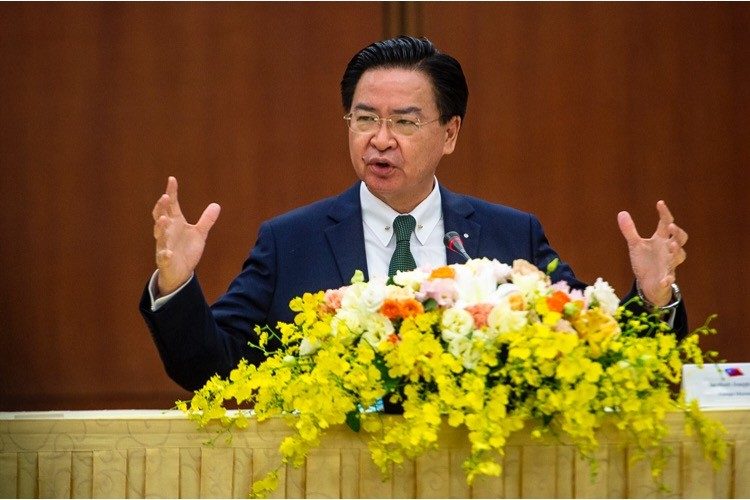
Taiwanese Foreign Minister Joseph Wu has declared that he thinks China is now “more likely” to invade Taiwan to divert attention away from authoritarian leader Xi Jinping’s domestic problems.
Wu said that 2027 was the year that such action could happen. His comments come amid rising cross-strait tensions between Taiwan and communist China, with the latter now flying fighter jets toward Taiwanese airspace and crossing the so-called median line — the unofficial maritime border — daily. The number of flights rose five-fold between 2020 and 2022.
Additionally, Wu said that the present “status quo” arrangement, in which Taiwan is self-governing but does not officially assert its independence, “might not last forever,” in a rare admission that the island might one day either be taken over by China or become an independent country.
Taiwan is a self-governing island that China sees as its own, to be reunited with the mainland by force if necessary. The Taiwanese government dismisses Chinese claims over the island.
Notwithstanding the fact that the Chinese Communist Party (CCP) has never governed the island, Xi previously portrayed the reunification of Taiwan with the mainland as the “core of China’s core interests.”
Although Wu admitted that “the situation in the last year compared to the two previous years is much worse,” he added, “To me, 2027 is the year that we need to watch out for.” Wu observed,
In 2027, Xi Jinping is likely to go into his fourth term, and, if in his previous three terms he cannot claim any achievement during his office, he might need to think about something else for him to claim as his achievement or his legacy.
If you look at the Chinese situation right now, the economy is going down. People are not happy, the real estate business seems to be melting down.
If Xi Jinping cannot change the situation domestically in China, you might want to resort to a use of force or creating a crisis externally to divert domestic attention or to show to the Chinese that he has accomplished something.
We are concerned that Taiwan might become his scapegoat.
Adopting a cautionary tone, Wu said that the “worst case scenario” happening is now “more likely” than in previous years, and highlighted how risky the situation can be.
“Look at the proximity of the Chinese aircraft to our aircraft,” he said, continuing,
If they cross the 24 nautical miles zone, some of our weapons systems might have to target those Chinese aircraft, and that might spark an accident, even though it might not be intentional for the Chinese pilots to cross the 24 nautical miles.
Very often, you see the sum of a tiny little accident might spark into a major war.
We worry that might happen.
The only thing to prevent that abrupt intensification of hostilities now, he added, is “self-restraint.”
“Our pilots are very well-trained; they know they cannot fire the first shot,” Wu said.
Meanwhile, there have been hints from military analysts that Taiwan is not adequately prepared if war did come to the island.
After all, Taiwan spends 2.4 percent of its gross domestic product (GDP) on defense, which is lower than countries such as the United States and around half the amount spent by Israel.
Moreover, analysts contend that Taiwan does not have sufficient munitions, grapples with meeting recruitment quotas within the armed forces, and has not channeled enough effort toward the type of asymmetric capabilities it would require to fight China.
While Wu dismissed the notion that Taiwan is complacent, he said that it has hitherto been slow to prepare.
“We understand that in previous years, we might not have acquired sufficient ammunition,” he said.
“In previous years, we might not have sufficient training for our military personnel. And in previous years, we understand that the number of our soldiers defending Taiwan might not be enough, but look at the reform measures the president has announced.”
Recently, Taiwan has increased the duration of mandatory military service from four months to a year, increased the defense budget, and is trying to begin local production of drones and missiles.
“We are trying everything we can to make Taiwan prepared, to make Taiwan capable of defending itself,” Wu said.
Furthermore, Wu reiterated that Taiwan would be willing to negotiate with China, but he was clear the island would not “welcome political preconditions.”
“Accepting those Chinese preconditions means that we are submitting to China, and that is something that the people here in Taiwan would never accept, but our door is open,” he said.
In addition, if China invaded Taiwan, there would be immense ramifications for the global high-tech supply chain “in weeks,” Doris Hsu, the chief executive of Taiwan-based GlobalWafers, one of the most important companies involved in making vital semiconductor chips, said to Sky News.
Hsu added that customers have “a lot of concerns” about China’s intentions in Taiwan, prompting the firm to locate its new plant in Texas.
Due to increasingly frosty China-Taiwan ties, fears have arisen that firms will seek to safeguard themselves by leaving the self-governing island and park longer-term investments elsewhere.
Taiwan is a key global player in technological development and manufacturing, especially semiconductors.
Semiconductors are the crucial microchips usually portrayed as the “brain” in modern electronics; they run everything from planes and appliances to cars and smartphones.
In spite of its relatively small size, Taiwan is the world’s 16th-largest trading economy, with many countries relying on its semiconductors.
Research group the Rhodium Group has surmised that any form of attack on Taiwan would impact $2 trillion worth of economic activity, without considering any sanctions or secondary impacts.
China is one of many nations also dependent on Taiwan’s high-tech sector, and this fact has been pointed out by some analysts as a reason an invasion may not happen.




